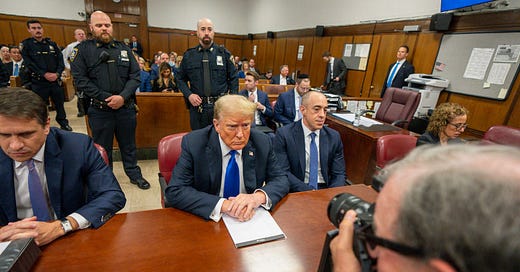I’ll be back in the (relatively) calmer waters of British politics soon but I promised a part two to last week’s post on Trump, his key appointees, and the imminent battles between them.
The first week has gone largely as expected. We had an incoherent inauguration speech where the most notable spectacle was a shifty row of tech CEOs (I saw an “embarrassment of riches” suggested as the collective noun).
Then there was the inevitable slew of executive orders with varying degrees of significance and legality. Many were performative, others that sound serious will likely never happen, some will cause immense pain and difficulty – like the decision to abandon several thousand Afghan refugees or pause lifesaving treatment for 25 million people suffering with HIV around the world. Again, as expected, there has been more caution shown on high-risk economic measures like tariffs, alongside plenty of bluster.
I was planning on covering foreign affairs, justice and healthcare in this post but as Dad looked at Ukraine policy during the week I’ve decided to focus in on justice, democracy, the constitution and the courts, and come back to healthcare at some point in the future when it’s clearer what they want to do.
After all, while Trump can do a lot of damage across every policy area, it’s mostly reversable. Biden undid a lot of the term one decisions in 2021. The biggest danger is that he makes changes to the structure of American democracy that aren’t reversable, because they lock his opponents out of the system permanently, or, more likely, fundamentally change the norms that any future president is willing to observe.
This risk of democratic backsliding is a very real one. Trump clearly has no personal interest in the rule of law or constitution – as we’ve seen in his claims that the last election was stolen and his immediate pardoning of those convicted of serious crimes during the 6th January riots.
Many members of his team are fans of the Hungarian Prime Minister Viktor Orban, who has used control of the media and changes to electoral rules to cement his grip on power while, just about, staying democratic enough to remain in the EU. Orban has become a key player in the global “National Conservatives” movement. (There is a startling irony in ethno-nationalists forming one of the world’s most effective global organisations.)
This worry about US “Orbanisation” is bolstered further by the way some media outlets, and many of the wealthiest Americans, have decided to essentially pay fealty to Trump rather than treat him like a normal politician in a democracy. When a national leader is seen as willing to operate outside of norms this is, at an individual level, often a rational response, even if it’s incredibly socially destructive.
In a fascinating interview Biden’s ambassador to Hungary, David Pressman, discussed how Orban has been able to accumulate enormous power without taking on the full trappings of dictatorship:
“When I walk away from this experience, one of the things that is most alarming to me is just how easy it is to actually control people. It doesn’t take secret police. It doesn’t take guns. It doesn’t take gulags. The reality is that if you have the ability to overwhelm the media ecosystem with lies, you make the cost of engaging in public debate so high that it becomes an existential one.”
The risk is obvious. But America is not Hungary. One never wants to be relying on constitutional safeguards, which can never, however tightly drawn, resist genuine tyranny backed by force. Nevertheless they can work to restrain the worst instincts of leaders and often did in Trump’s first term. Will they this time?
Keep reading with a 7-day free trial
Subscribe to Comment is Freed to keep reading this post and get 7 days of free access to the full post archives.




